- Home
- Ian McDonald
Brasyl (GollanczF.) Page 12
Brasyl (GollanczF.) Read online
Page 12
‘Oh my God, is this something like we’re all going to have to do now, change clothes at lunchtime?’ Agnetta flapped.
‘What are you talking about?’
‘Like, when you were in just now you were in the suit and now you’re in the Capri pants.’
Marcelina shook her head. Eighty percent of what Agnetta said to her was incomprehensible.
‘Any calls for me?’
‘Same answer as five minutes ago,’ Celso said, mixing wasabi.
Marcelina held her hands out in a shrug of bafflement.
‘What is this, National Freak Marcelina Hoffman Day?’
Then she saw Adriano break from his creative huddle with Lisandra and the Black Plumed Bird to beckon her with a lift of the finger, a raise of the eyebrows.
‘That was a very funny e-mail. Someday someone will make a program like that and the ratings will be through the roof, but I don’t think it is Canal Quatro. In fact, if I thought you were seriously proposing a series where members of the public hunt down and assassinate favelados like some kind of “Running Man” show, I MBATC.’
Might Be A Tad Concerned.
‘Ah, well, yeah . . .’ Marcelina spluttered.
‘In future, IMBAGI to pitch ideas through the regular creative channels.’
She returned blazing like a failed space-launch to her luvcluster. Lunches were set down in a flash.
‘I don’t know whose idea of a joke that was, but nothing ever, ever goes out of this production team unless it’s cleared by me. Ever.’
‘We always do that, boss.’
She turned on her laptop.
‘Well, someone sent a hoax e-mail to Adriano, and it wasn’t me.’
‘It was,’ said Agnetta faintly. ‘You did it. I saw you.’
The chattering, ringing, beeping tunnel of the Glass Menagerie suddenly turned on end and Marcelina felt herself falling through desks and workstations and heaps of paper toward a final shattering on the great window become a floor.
‘Imagine I’m very very stupid and haven’t the faintest idea what you’re talking about.’
‘About five, six minutes ago you came in, said hello, logged onto your laptop, and fired off an e-mail,’ said Celso. Cibelle sat back in her chair, arms folded.
‘But my laptop is biometric locked.’ Standard security in a world where ideas were currency.
‘Well, it’s open now,’ Celso said.
Marcelina went to the screen. The login icon spun in the taskbar. She opened the in-house e-mail system.
To: [email protected]
From: [email protected]
Subject: Take Out the Trash . . .
The glass tube of the development office revolved around her, Marcelina a shiny ort in a kaleidoscope of flying madnesses.
She had drunk the tea.
The Green Saint was the saint of visions and illusions.
Feijão had the sacred vine growing in his garden.
The Barquinha of Santo Daime was a church of hallucinations.
She had drunk the tea. There was no other rational explanation.
Marcelina closed the program and touched her thumb to the log-out pad.
OCTOBER 12, 2032
A trip to the market. A trip into the biodiesel smog beneath the unfinished rodovia intersection of Todos os Santos, the missing buckle of the cincture of highways that binds the city of Saint Paul. A trip to the printer, to buy new shoes.
The taxi drops Edson and Fia at the edge of Our Lady of Trash. It’s not that the drivers won’t go inside - and they won’t no matter how high you tip them - it’s that they can’t. Todos os Santos, like hell, is arranged in concentric rings. Unlike hell, it ascends: the summit of the great waste mountain at its heart can just be glimpsed over the roofs of the slapped-together stores and manufactories, the pylons and com towers and transmission lines. The outermost zone is a carousel of motion where cabs, buses, moto-taxis, private cars drop and pick up their rides. Trucks plow through the gyre of traffic, blaring tunes on their multiple digital horns. Priests celebrate Mass under the forest of big umbrellas that is Todos os Santos’ rodoviaria, along rows of neatly spread tarpaulins piled with pyramids of green oranges and greener limes, shocks of lettuce and pak choi, red tomatoes and green peppers, past palisades of sugar cane waiting for the hand-mill and past the chugging, sweet steam of cachaça stills. The first circle of Todos os Santos is the vegetable market. Every hour of every day motorbike drays, cycle carts, pickups, refrigerator vans bring produce in from the city gardens. There is never a time where there are not buyers pressing in around the farmers as they unload boxes and sacks onto the spread ground-sheets, the clip-together plastic stalls, the rent-paying shops with shelving and cool cabinets. By night the buying and selling continues unabated by a million low-energy neons and, for those who can’t afford biodiesel generators, lantern light; and for those whose profit margin would be damaged even by that, stolen electricity.
‘My mum does this,’ Fia says. ‘She has a little urban farm, a couple of backlots, and she hires half a dozen rooftops. She wouldn’t come here, though; she specializes in designer brassicas for the Japanese restaurant market. She’s boring. It’s beautiful.’
She’s secretive; she takes it slow. Edson hasn’t gotten to kiss her yet, let alone sex. Over kibes in that little Arab lanchonete he had promised (and they had not disappointed - Yellow Dog lanches would soon be added to the De Freitas Global Talent portfolio) Edson had thrilled her with his telenovela of family: The Sons of Dona Hortense. Emer the bricklayer who bought a share in a gym with the money he brought down from the tower cranes of São Paulo; Ander the dead this eight years gone, cut down up in the favela; Denil the builder of fine planes for mighty Embraer; Mil the soldier boy in a violent and foreign land, remembered every night in Dona Hortense’s Book of Weeping that no high-velocity round might seek out his blue beret; Ger the aspirant malandro if he could do a decent day’s work; and Ed the man of business and affairs and talent management and many faces who would one day buy this lanchonete, turn it into an empire, and retire to his place by the ocean to watch the sun rise out of the sea. The Brothers Oliveira: on festivals and public holidays the house was so full of testosterone that Dona Hortense would send them all out into the street to play football; anything to work off the male aggression.
Fia had applauded but turned away his question about her family. Edson supposes there’s only so much you can say when you are a secret quantumista.
Now they’ve been out together ten times and she’s taking him to Our Lady of Trash to buy a pair of shoes and telling him finally about her family.
‘And my dad runs a stable of accountancy ware, but what he really likes best are the pieces he writes for this cheesy New Age feed in Brasilia. He’s got this idea of fusing Mahayana Buddhism with umbanda Paulistana - as if Brazil doesn’t have enough religions already. My kid brother Yoshi is on a gap-year - he’s surfing his way around the world. All the girls think he’s fantastic. And I grew up in a little house with black balconies and red roof in Liberdade like six generation of Kishidas before me. We had a swimming pool and I had dolls and a pink bike with candy-stripe ribbons on the handlebars. See? I told you it was boring.’
‘Do they know what you do?’ Edson asks as Fia hauls him by the hand through the temporary alleys between trucks and buses.
‘I tell them I’m freelancing. It’s not a lie. I don’t like to lie to them.’
Edson knows the date is a test. Our Lady of Trash rules a landscape of superstition and street legend. Whispers of night visions; strange juxtapositions of this city with other, illusory landscapes; angels, visitations, UFOs, ghosts, orixás. Some, they say, have received strange great gifts: the power of prophecy, the talent to discern truth, the ability to work the weather. Some have been lost entirely, wandering away and never returning to their homes and families, though relatives may sometimes glimpse them among the trash towers, close yet far away, as if trapped in a maze of mirro
rs. It changes you, they say. You see farther; you see things as they really are.
Edson’s damned if he’s going to let Todos os Santos scare him. But it surely is a place to move with confidence and smarts, and so he has dressed for authority and jeito in a white suit and ruffle-fronted shirt. Fia’s shopping outfit consists of slinky boots, goldielooking shorts with button-down pockets, calf-length shimmer coat, and Habbajabba bag.
‘Hey!’
Edson almost dislocates her shoulder as he yanks her to a stop. She turns, cartoon eyes wide, to open her hot little temper on him and sees the garbage truck sway to a stop blasting all fifteen horns at her. The driver crosses himself. Trucks pile up behind him, a garbage jam. There is one direct road into the heart of Todos os Santos, and it belongs to the huge municipal caminhãos da lixo, laboring through dust and biodiesel reek. Their multiple wheel sets deeply rut the red dirt road; under rain it turns to mud and the trucks lumber and lurch axle-deep, like dinosaurs. The track leads to the only completed on-ramp of the unfinished intersection; from it they wend higher, like some kid’s Hot Wheel toy-car set, up the curving roadways until they reach the edge of the drop, reverse, lights flashing and warnings yelling, to evacuate their bellies onto the ever-growing trash mountain of Todos os Santos.
‘Saved your life,’ says Edson. Fia holds his eyes for three seconds. That’s enough to signal a kiss. But Edson hesitates. The moment is lost. She lets slip his hand and heads up into the second circle. This is the district of the ware shops, the copywrong vendors, the black pharmers. Your child has tuberculosis, flu, malaria? HIV? Here’s a pill for your ill, at noncorporation prices. You can’t get yourself up in the morning, your husband just wants to sit and watch telenovelas all day, your children won’t go to school and are eating the walls? We can give you something for that. It’s been how long since you last had an erection? Oh my man, I feel for you. Here. And it will make you come buckets. You really like this track this movie this installment of BangBang! or A World Somewhere but you can’t keep up the rental payments and don’t want to lose it at the end of the month? We strip it, you keep it. Entertainment is for life not for hire. You want, you need, the futebol feeds but you can’t afford the payments? We have a chip for every need. You are a man of debts, mistresses, crimes; seguranças police priests lawyers lovers wives after you? Here are eyes, here are fingerprints, here are names and faces and alibis and doppelgangers and ghosts and people who never lived. We can wash you purer than the crentes’ Jesus. And among them, a spray-bombed pink door to a tottering upstairs office and a hand-rollered pichacão sign slung on a self-adhesive peg: Atom Shop is Open.
It wasn’t always sex and spandex. Today Mr Peach was making Edson a moqueça. You need feeding up, Sextinho; you don’t look after yourself. Wasting away like a love-struck fool. Superhero costumes were hung up in the Bat-wardrobe. Mr Peach was dressed now in dreadful shorts and a beach shirt. Edson in his sharp-creased whites said, ‘I still can’t believe you knew her at São Paulo U.’
Onions slid into the pan with a hiss. It was an old family recipe, a slave dish from the coffee estate days. Captains and masters were the Alvarangas, but they faded and failed until only one remains of the name. Edson has an enduring fantasy that Mr Peach makes him son and heir of Fazenda Alvaranga.
‘Why so surprised? It’s a big multiverse and a small world, even smaller in quantum computing. I was an adviser on her doctoral dissertation in computational and information physics. Her thesis was that all mind is a multiversal quantum computer and therefore a fundamental element of reality, and also linked across universes by quantum entanglement. I always enjoyed sessions with her; she was one of my top students. Scarily bright. We’d argue the toss - she had a foul temper. Great arguer. Have you discovered that yet? Her theory was that the multiverse is a massively multiply parallel quantum computer and therefore a mindlike state. I’d argue that was metaphysics at best, religion at worst: whatever way you looked at it you ended up back at the strong anthropic principle, and that’s another word for solipsism. There’s nothing special about us. Given enough universes, something like us is bound to occur, many times over.’
A rich tang of garlic, then the astringent perfume of peppers.
‘I’m not surprised she’s working with the quantumeiros - I couldn’t see anything in academia or even research giving her that adrenaline rush, but I can’t say I’m delighted.’
Crayfish now, fresh from the pond-farm up on the hill under the wind turbines. The power farms with their rotors and golden fields of rape crept down on the Fazenda Alvaranga while the housing projects crept up; street by overbright street and Mr Peach gave his heritage away to Edson table-lamp by painting by vase. It was as if he wanted the Alvarangas to be gone, wanted to disappear completely. Mr Peach slid a serving straight from the pan onto a plate; drops a little chopped coriander on top, green on yellow. A patriotic dish.
‘But the real question is: have you fucked her yet?’
‘I thought we’d agreed that we could see whoever we liked, that it didn’t matter.’ Knowing that Mr Peach had a wide circle of friends straight and gay, none of whom he would ever dress up in Lycra and cape.
‘It doesn’t matter until it’s one of my ex-students.’
Edson had been uncomfortable with Mr Peach’s former relationship with Fia since the Captain Superb/Miracle Boy session. They had been through Captain Truth/Domino Boy, Bondage Man/Pony-lad and Lord Lycra/Spandex Kid, and Edson still felt as if he was sharing her.
‘Well, she may be super-bright, but I bet you didn’t know she watches A World Somewhere. Addicted to the thing. She’ll download it and we could be having a beer or eating something or even at a club and if she doesn’t like the music, I’ll see her watching it on her I-shades.’
‘She always was like that.’
Edson pushed his plate away from him.
‘I’m not hungry.’
‘Yes you are. You’re always hungry. Does your mother not feed you?’
‘My mother loves me. You don’t talk about my mother like that.’
They were having a fight over a woman. Edson couldn’t believe it. They were letting a girl come between them. And Mr Peach had taught Edson much more than postcoital physics. He had educated him in other disciplines: shaving and how to buy and drink wine and shake cocktails; dressing for style not fashion; ten ways to knot a tie; etiquette and how to talk to people to make them appreciate and remember you and call you back and what women expect and like and what men like and expect and how to be respectful but still get your own way in a hierarchical society.
Once when he was very small a man hung around outside the house and Edson asked Dona Hortense if he was his father. Why bless the child, no. The days when men would come round to play cards and drink were gone, but Edson remembered the heat of that embarrassment in his cheeks.
Edson glanced over at Mr Peach, the tanned skin, the wiry gray hair sprouting from his shirt collar, the thin legs rattling in the baggy shorts. You are the father I never knew, the father I suck off.
‘Just eat it,’ said Mr Peach. ‘For me. I like making you things.’
Edson suspected that Mr Peach may not have set the worlds of quantum physics ablaze, but in one area he excelled. He was a great cook of old slave food.
In Atom Shop Edson hunts for kissable moments. As she brushes between him and the big 3-D polymer printers, as she leans over to squirt the design from her I-shades into the renderer, as he bends with her to study the holographic image of the noo shooz on the screen. A touch, a whisper, the scent of her perfume and honey-sweat and fabric conditioner but never contact.
‘Good bag,’ says the girl on the reception, who has eyes the size of mangoes and a cloud-catching look from the fumes. The place smells strongly of plastics, like glue-sniffers’ paradise. ‘This original?’ Fia hands it to her. She holds it up to the light, turns it this way that way, squinting, peering. Atom Shop prints print necklaces, hats, earrings, formal masks, body armor, wat
ches, costume shades, I-clothing, anything you can weave from smart polymers. Top-marque handbags. ‘Looks like it. We couldn’t print at that resolution.’
‘I know,’ says Fia clutching her bag back to her. ‘But you can do me these shoes.’ She touches her I-shades and loads the pattern onto Atom Shop’s house system. Edson does not doubt it’s stolen. Bad thing to get shot for; copywrong violation on a pair of top-marque shoes. The girl loads up the cartridges, closes the transparent cover. Lights blink on, mostly yellow. The print heads rear like striking snakes, then bend to their furious business, molecule by molecule, millimeter by millimeter, building the soles and heel-tips of a pair of Manolo slingbacks.

 Empire Dreams
Empire Dreams The Menace from Farside
The Menace from Farside Luna: Moon Rising
Luna: Moon Rising Moon Rising
Moon Rising Desolation Road dru-1
Desolation Road dru-1 Empress of the Sun
Empress of the Sun Ares Express dru-2
Ares Express dru-2 Tendeléo’s Story
Tendeléo’s Story River Of Gods
River Of Gods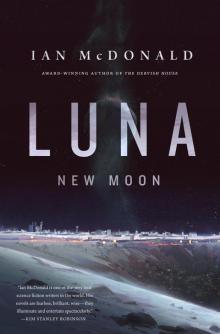 Luna
Luna![Cyberabad Days - [River of Gods 02] Read online](http://i1.bookreadfree.com/i1/03/29/cyberabad_days_-_river_of_gods_02_preview.jpg) Cyberabad Days - [River of Gods 02]
Cyberabad Days - [River of Gods 02]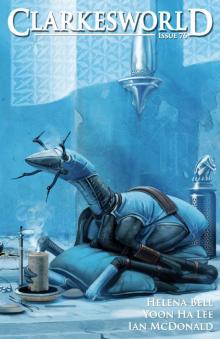 Clarkesworld Magazine Issue 76
Clarkesworld Magazine Issue 76 Brasyl (GollanczF.)
Brasyl (GollanczF.) Scissors Cut Paper Wrap Stone
Scissors Cut Paper Wrap Stone Chaga
Chaga Time Was
Time Was Cyberabad Days
Cyberabad Days Be My Enemy
Be My Enemy Changa
Changa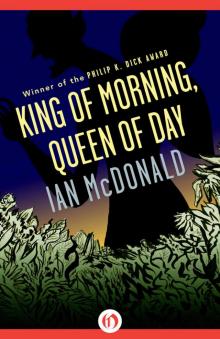 King of Morning, Queen of Day
King of Morning, Queen of Day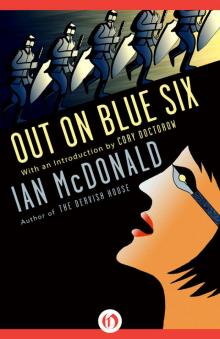 Out on Blue Six
Out on Blue Six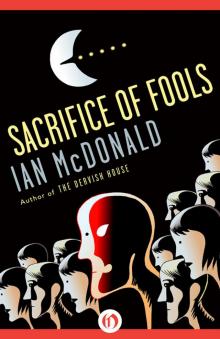 Sacrifice of Fools
Sacrifice of Fools Desolation Road
Desolation Road Luna--Wolf Moon--A Novel
Luna--Wolf Moon--A Novel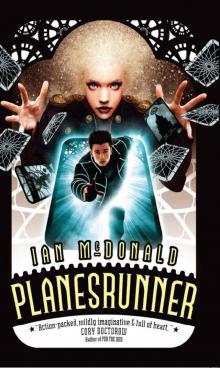 Planesrunner (Everness Book One)
Planesrunner (Everness Book One) Ares Express
Ares Express